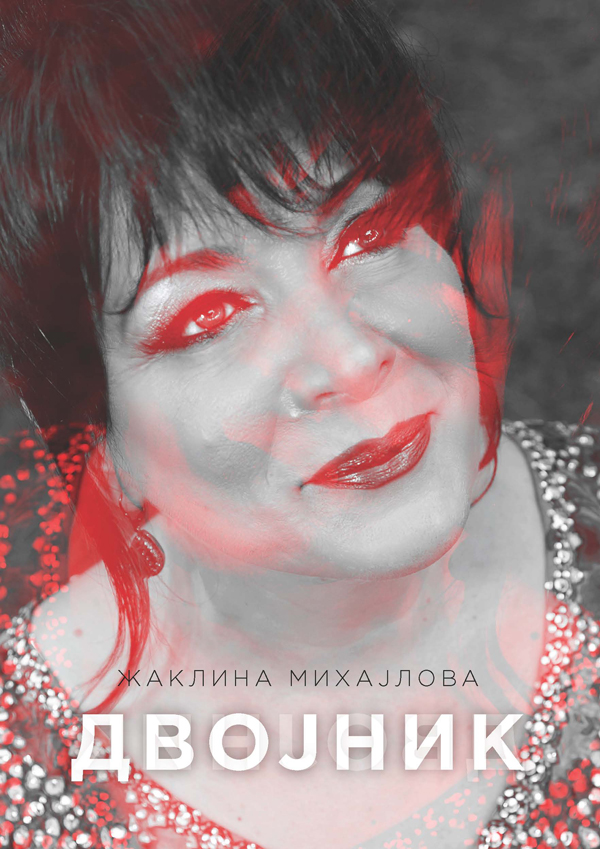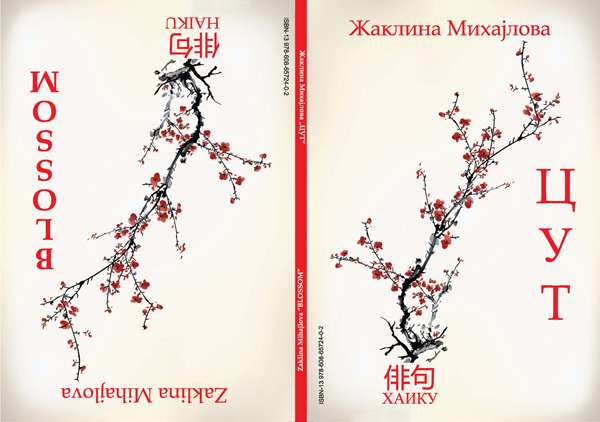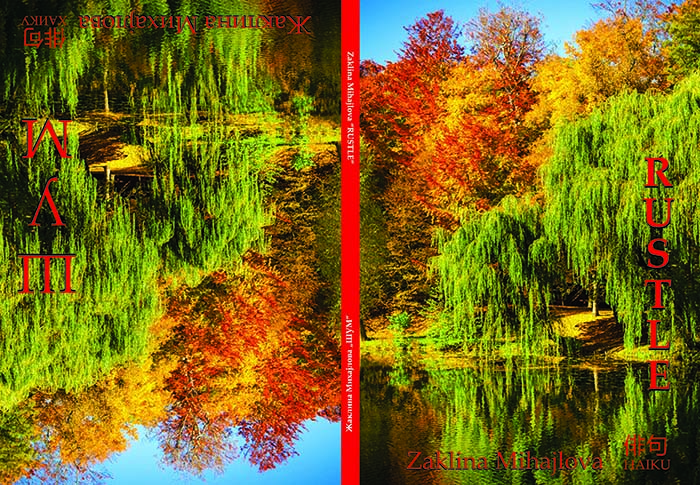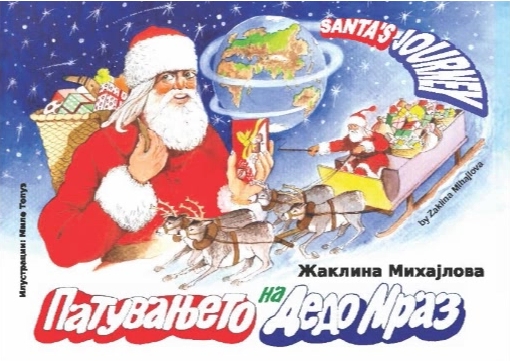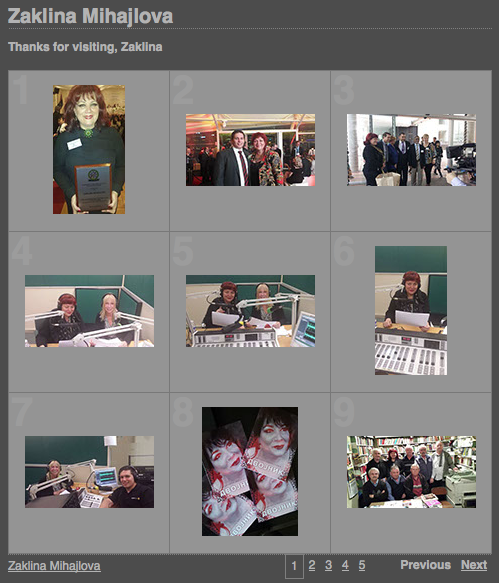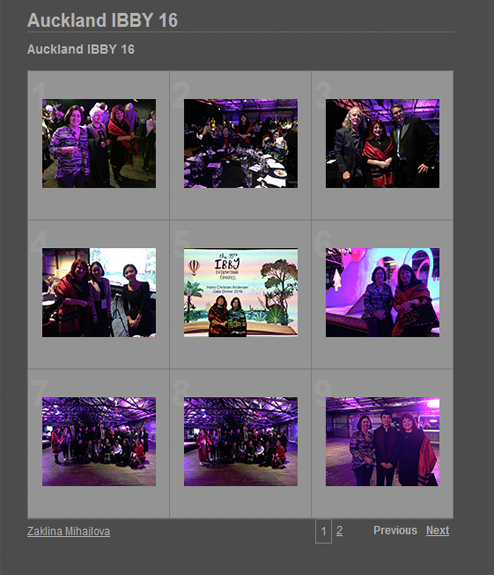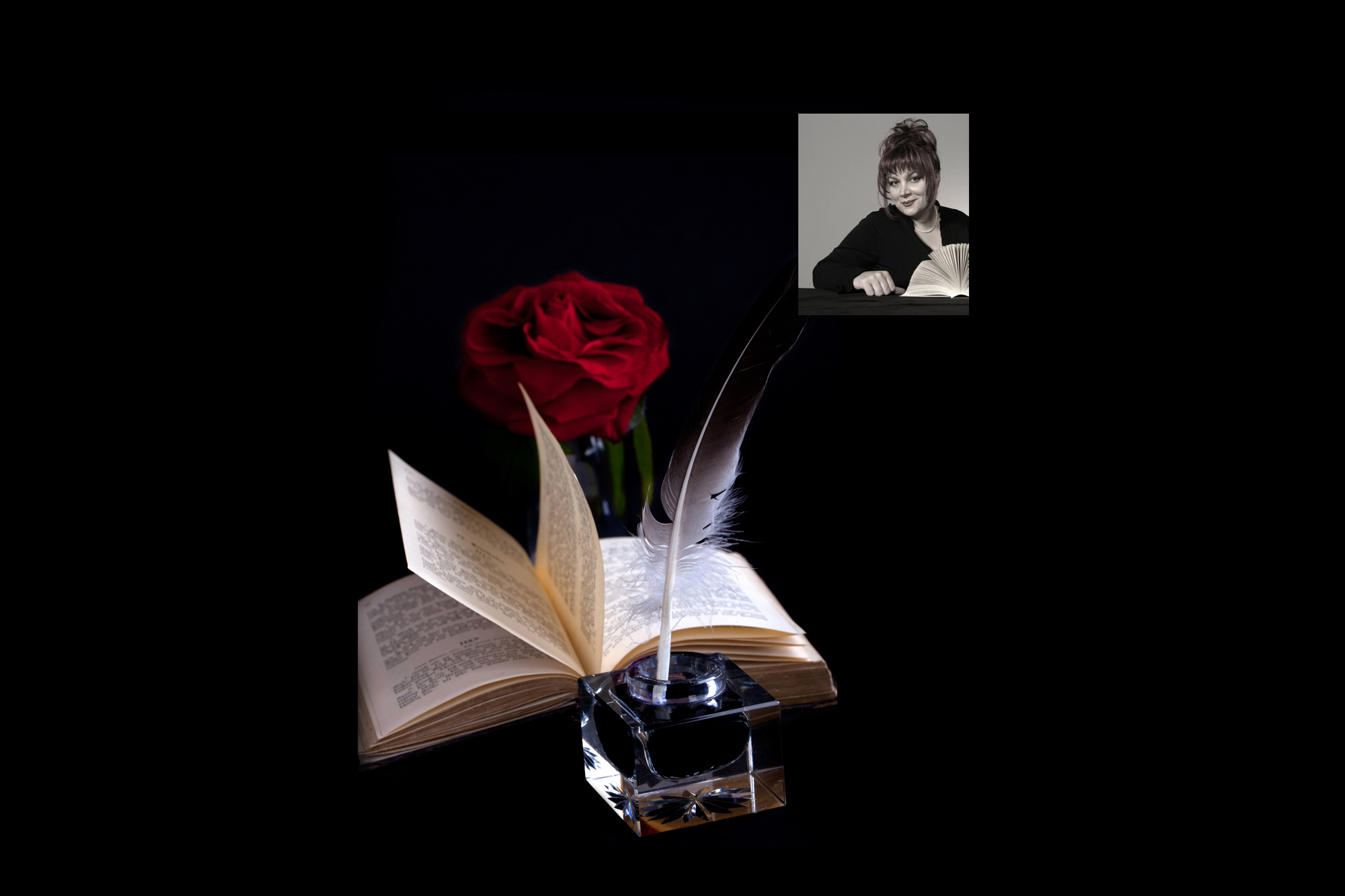









Welcome
Welcome to my website!
I write emotional poetry, prose and children' books.
No matter what the genre, you're guaranteed an emotional read!
If you prefer something a bit more edgy, read my short stories.
Thanks for visiting,
Zaklina
Biography
Zaklina Mihajlova was born on the 10th of March, 1964 in Kochani, Macedonia. She has lived and worked in Sydney since 1990. In 1984, Zaklina COMPLETED the Teachers Academy in Skopje, and in 1986 graduated from the Faculty of Philology, at the Ss Cyril & Methodius University, majoring in "National Literature and Macedonian Language”.
She has been promoting literature and culture since childhood. Zaklina was a member of the Children's Radio Drama at the National Macedonian Radio and acted in roles in several radio PLAYS and television series. She later worked as a reporter and a television host for the National Macedonian Television Channel. She was also a high school teacher of Macedonian language at the Rade Jovcheski Korchagin High SCHOOL in Skopje. Zaklina worked as a Macedonian correspondent for several newspapers and magazines around the world, and also as an editor and presenter of the Macedonian radio programs Macedonian Pearls in Wollongong and Macedonian Voice in Sydney. Today she works as a Macedonian language teacher at Carlton Public SCHOOL, Sydney. She is one of the founders and editors of the Macedonian TELEPHONE DIRECTORY for NSW and Canberra – the most published publication in the Macedonian language outside of Macedonia. Zaklina Mihajlova is an activist and humanist who promotes the Macedonian language and culture and who voluntarily works on organization and creation of events that encourage preservation of the Macedonian culture and traditions. She is the initiator, and for more than 20 years the organizer, of the Macedonian Business and Professionals Ball. Furthermore, she was an organizer of a number of amateur music festivals in Australia, as well as two children's music festivals in Sydney, 'Makedonche' and 'Golden Nightingale'.
Zaklina has also published poetry and literary texts in various literary magazines and newspapers around the world. She has published the poetry BOOKS "Walking on a Wire", "Clon", a book with haiku poems "Blossom", as well as a book for children, " Santa's jorney ". Zaklina is a member of the Literary Association of Macedonia, of the Association of Journalists of Macedonia, the president of the Macedonian School Council of NSW, a committee member of the Federation of Community Languages in New South Wales, a member of the Modern Language Association of NSW, a member of the Macedonian Literary Society, Grigor Prlicev, in Sydney, a member of Australian Macedonian Theatre, and a member of several welfare organisations.
Books
Audio
Children's - Santa's Journey
Audio illustration.
Reviews
Hristo Petreski, Ph. D.
Blooming in her own "BLOSSOM"
Today haiku is one of the leading creative gains not only to the Japanese but also to the world literary works. In contrast to the other artistic genres, haiku is a rare example of the understanding of the genesis from the elite to the massiveness. As a lyrical miniature, haiku shows the contrasts and the tones, the vividness and the thought, the reality and the moral. Haiku poetry today is a global cultural phenomenon, and research in both this area and our own environment is more than necessary, not only because there is a large number of Macedonian haiku poets but also because haiku is becoming one of the most dominant and most respectable literary genres in the world.
Only in Japan, millions of haiku poems are created every year, and even more are written outside the borders of the land of the rising sun. Because of its territory and the popularity of haiku, the Macedonia is one of the world centres of it. Haiku surely penetrated in the Macedonian cultural and spiritual space in the last decades of the last century. One of the newer haiku writers is Zaklina Mihajlova, who is offering us her haiku poems. Her short (haiku) poems reflect her world view, her personal and emotional sensations, her observations of everyday life, her meetings with nature and people, the love, the urges, the passion…
Mihajlova is urging us to think creatively and metaphorically about the concepts in her haiku poems. Although this is her first book of haiku poetry, Mihajlova religiously follows the syntax and the basics of this type of poetry, capturing her experiences intensively, precisely, and at the same time, philosophically thinking of them. Out of every experience, she creates a story about revelation which is an essential element of haiku and in close connection with the way we perceive the world. This revelation depends on our new perception, the way we see things as for the first time and at the same time, it depends on our feelings that once we've seen it, we know that this observation is real, as if we have always known it, and that it's also reality (which will last) forever. In "Blossom", the poetess presents 132 'blossoming' haiku poems, illustrating subtly on paper the messages between nature and man's soul.
Mihajlova, the poetess, surely enters the haiku world and cleverly she brings the wisdom to the surface as a flash of witnessing the haiku moments as well as giving a lesson to and opening the eyes of the reader. Introspectively outstretched between life and nature, she exclaims: "Grieving forthe tree/ the birds sing sadly/ protesting", and she notes:" I trundle over/through time/ time through me is flying!" Different themes are shown through her haiku poems: about love: "As the thunderstorm –/I shamelessly stole you/a moment to remember!" about sadness: „Torrents outside/torrents create/floods inside!"; and about pain: „ A kangaroo jump in/an abyss is the migration/alienated man! “ Haiku tends to objectify the reality and look at it from the outside not from the inside, something that is evident in Mihajlova's haiku poems. Because of this, we welcome Zaklina Mihajlova in the world of haiku and sincerely recommend this book of poetry to you, the readers.
Trajce Kacarov, M.A.
IN THE FORM, THE SOUL
(To "Blossom", the new book of poetry by Zaklina Mihajlova)
They are sitting at the dining table. They come from all walks of life. Some know each other. Some see each other for the first time. However, they are all sitting at the dining table, drinking, having fun and discussing on themes they initiate themselves. And the themes are related to life, they are about everything that makes life. But, someone needs to bless the food, at least that's what is done according to our Christian religion. This is often done by the most senior person, but it's not rare to be done by the person who because of certain merits has been given the honour to bless the food. He stands up, raises his glass and on behalf of everyone present there at the dining table, he blesses the food and indicates the beginning of 'pigging out', sorry, I meant, the feast. This is how a fragment that I've read in "The Feast" by Ernst Jurgen, a German writer and philosopher, can be somehow explained.
However, all the above would be meaningless, if I don't tell you what I was most impressed by reading this fragment in the Jurgen's story. I think I'll always remember the discussion at the table. First, they talked about wine, and then they discussed the art, the theory and the instinct and their influence on the creation of art. Nevertheless, we shall begin with the wine. In his story, Jurgen writes: „Ortner
was assigned to bless the food. He approached the table where there was a glass pitcher full of wine shining in it and he was the first to taste it…
First, according to the rules, we'll drink three glasses together and then we can talk about anything except politics. "This is how the feast started where while raising their glasses with wine, people commented: "The wine hovers as if it's been poured in something invisible which holds it invisibly in its pure essence, in its pure form. The glass is a body; its content is the soul. "Proposing toasts to each other, the discussion didn't go far from the art, so they told each other that: "There is no art without a calendar". Or, that the theory of art and instinct affect the art work as if being grammatical accuracies and splendid poetry in an absolute sentence, in other words, the art or creating art is a primitive act and it resembles blood transfusion. Anyway, what I wanted to say when referring to the fragments from "The Feast" is the syntagm: "A work of art is created when the infinity meets the epochal, same as the wine in this glass". And now, the reader rightly may ask why I start the review of a poetry bookwith a reference to wine and what has been said during a feast. It's because
I believe that poetry is:
-a primitive act and nothing else than blood transfusion.
-to what extent is this a theory or practice, it's also an instinct.
They cannot exist without each other. The feast, the sitting and dining at the table are also practice and instinct. Life is nothing else but attending a feast, sitting at the table where one can see many things which can satisfy our natural hunger as well as our hunger occurring from living in a society, or from the gains of civilisation. For me, the verse, the poem is a glass in which the soul, the eternal, has been poured. In it, the word, the content seems to hover as if contesting the gravitation, as wanting to say, 'here I am, the one that can conquer the space as well as the time'. Some accept different forms just because of this role of the verse or the poem. I will again return to "The Feast". In this story, one of the persons drinking wine wanted it to be poured in a clay glass. His excuse was that he wanted the wine to be poured in a glass made of earthy material and to drink it because 'we, people are born from earth and we return to it'. So, it's not rare for people who write poetry to choose different forms. Some write sonnets, some write ballads, and some haiku. Our poetess, Zaklina Mihajlova, has chosen the haiku as a form for the spiritual content. She raises the haiku high and toasts not only with its colour, nor with its form, but with its soul. She toasts loudly saying: "Everyone is sleeping,/I am the one drawing/a dream out of reality!
" …" There was an earthquake,/I seethed with /frustration, too!"…" Like sole tree/standing in the desert/love is rare"… "Through nettle/the true love passes/worms in the soul"…" Whistles around eaves/snow melting sadly/new spring
“..."Early autumn,/I am ripe on the inside,/same as the nature."..."White snow/covered the shores, /what a treasure!"...„Leaf after leaf falls/Autumn is in me as well/ years quench “..„Volcano - Erupting from/its bowels/the soul is burning
…“Grape vine - Its roots are distant/ but its fruit is/eternal, mine… “ And with these poems we contribute to the understanding of our perspective that poetry is related to the instinct, the soul, the spirit, and same as without having a glass, the form or the theory, if you want. Our poetess has written herself that she is an ocean, a volcano. There is restlessness and fire in her womb, and she also has the power and courage to showthis to the world, in other words, to seek witnesses of her spiritual act or to start to transform the infinite into epochal. With this book of poetry, she presents herself as a gourmet with discriminating taste in words and poetic speech as she puts the verses in a form which far and widely show their essentialism. Therefore, I can easily say that this book of poetry by Zaklina Mihajlova is a result of strong, healthy and fiery speech. A divine drink she offers, the one whose glass is only a casual form that does not lead her to infinity.
Gordana Mihailova Bosnakoska
A DIALOGUE WITH ONESELF
("Walking on a High Wire" by Zaklina Mihajlova)
"Walking on a High Wire", the first book of poems written by Zaklina Mihajlova offers poems the poetess has been creating for several years, as captured moments of reflection on herself, reflections that are deeply present from the first to the last of the poems in this book. This thrust into hercarries several characteristic elements. First of all, these are poems define as a theme, her life in Macedonia as well as in Australia. In the interspace between the two are poems linking her to events and persons, poems dedicated to them, poems through which her relationship with them is formed.
Her observation and intellect determine these interests, which through the expression of poetry deliver an emotional, intimate and personal experience, uncovering a dialogue of the author with herself. Through her poetry, she seems to question her own feelings and relationship toward the particular theme thus creating a universal message she sends, but in which she herself dwells.
We could point out the poems dedicated to the first main theme, inspired by life, although there are some among them that spring as new experiences and new awareness. The reflection of the new images and new understandings represent a lyrical contemplation of a deep and extremely personal experience, suggesting a discovery of not only new events but also instances deeply embedded in the author's consciousness as peculiarities that need to be held onto. Here, the following poems should be particularly mentioned, "At Sunset", "Passing By", "Life", "The Flow" and others.
Some poems can be considered patriotic as well due to their theme because they are very original impressions, echoes of the images she has kept within herself. They are told in a light, sentimental manner which makes them acceptable as poems of the readers themselves. In these poems Zakilna Mihajlova interprets the characteristics of the theme subtly and emotionally. In this context, the poems "Feast Day", "Angels" and "To My Father" should be mentioned.
Both the poems about her homeland, Macedonia, and the poems about Australia are interesting. They carry the seal of the characteristics of these two countries, situated on two very different continents.
In the poems dedicated to Macedonia, the author's indelible, unique and lifelong love of Macedonia is explored in an original way, determining the attributes and specificities of the enormous virtue of her cherished homeland. This love is expressed in "Ilindenska", "Code", "To Jesus". However, she also shows her fear of the present reality, fear that runs as a cry through the verses of "Macedonia Today".
The poems "Uluru", "Talbingo", and "Sydney" are poems that carry specificities of a new experience, consisting of images of the surroundings and nature perceived completely emotionally by the author.
With all the above mentioned distinctions and virtues, Zaklina Mihajlova's book "Walking on a Wire" will undoubtedly be a great contribution to Macedonian literature.
Mihail Rendzov
THIS IS ME…
("Walking on а Wire" by Zaklina Mihajlova - poetry)
The poetic letter written by the poetess Zaklina Mihajlova is deep and sensual, carving a place on its own and within itself. It brings to light what she perceives in her own being, her own life. Her poetic expression is sincere and astute.
In her writing, she leaves an imprint – a guiding light to her own emotional being, yearning and thought. She does not write the verses; instead they flow, spring and overflow. This rush is sincere to the extent of pain.
With this book she leaves behind a proof of her own emotional being, the richness of her personality, full of emotions and perceptions of life, people and events. With her book she wants to say, "Well, this is me, Zaklina Mihajlova, with all my perceptions, yearnings, sorrows and feelings for the people, the homeland, the place where I live, life in general”.
Reading this book uncovers the poetess – in her true light: sincere, pure and close.
Events
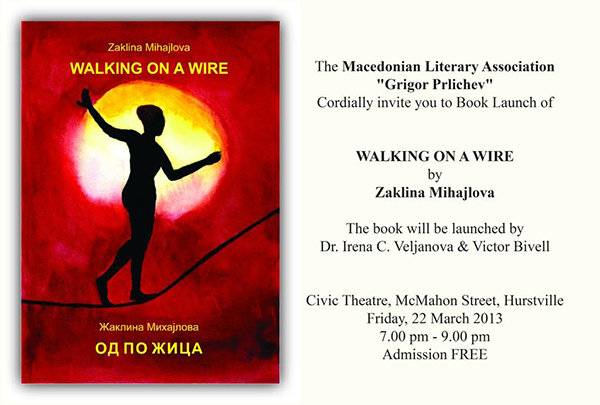
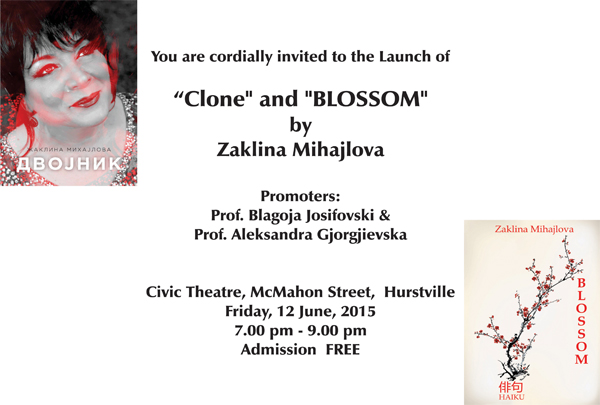
Contact
41°52'53.3"N 22°30'13.1"E


